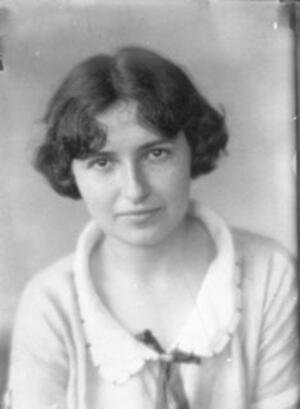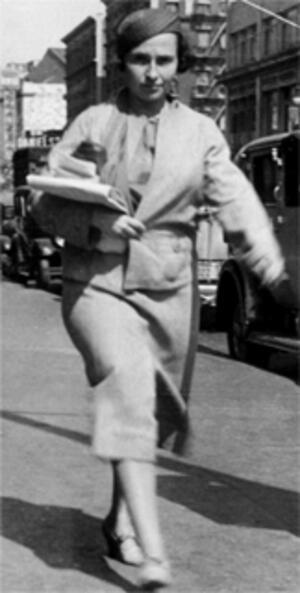Lucy Kramer Cohen: A public-spirited woman/a private inner life
Ever dream of making a film about someone you wanted the world to know more about? I did, and after ten years, I have completed A Twentieth Century Woman: Lucy Kramer Cohen 1907-2007 about the life of my aunt. It started out as a family project, but as the years went by, I found it was a story that resonated with me and, as I learned, with others who had never known this remarkable woman.
The daughter of Jewish immigrants from Austro-Hungary, Lucy attended Barnard College and Columbia University, where she studied with and worked for Franz Boas, one of the founders of modern anthropology. In 1931, she earned a masters degree and married Felix Cohen, who had just completed a Ph.D. in philosophy from Harvard and a law degree from Columbia.
During the 1930s, they worked with and for Native Americans to correct the injustices of the past and to give Indians more control over their lives and lands as part of Roosevelt’s “Indian New Deal.”
The 50-minute film captures Lucy’s intensity, intelligence, and complexity; viewers often mention that they “want to find out more about her.” Although she shared much of her life openly with family and friends, she guarded her private thoughts and feelings. In our world of confessional autobiographies and Facebook frankness, Lucy’s reserve is unfamiliar and a bit baffling to us.
Although Lucy was a vivid and familiar presence in my life from childhood on, as I worked on the film I realized how much I hadn’t known about her. She rarely discussed her own accomplishments and almost never her own feelings; these she kept to herself. She was open and warm and, at the same time, very reserved.
Lucy Kramer Cohen was a professional woman as well as a mother of two daughters. Widowed in her mid 40s, she would come home neatly turned out in her suit, hat and handbag from her job. She also managed to be the center of an ever-expanding network of family, friends and colleagues. She organized holiday celebrations — like the annual “succos” party in the back garden that the neighborhood kids called the “circus.” She extended friendship, hospitality (and sometimes credit) to countless people.
When we asked Lucy about herself, she told us about the people she had met or visited and what they were doing. She told wonderful stories and good stories were told about her: for example, when Eleanor Roosevelt invited Felix and Lucy to a reception at the White House, Lucy appeared. “Where is Felix?” inquired Mrs. Roosevelt. “He had to stay home with the children,” she responded.
Felix Cohen was and remains a towering figure in Indian law. I wanted to explore what Lucy accomplished. I wanted to capture her energy, her intelligence, her story before it was too late. In 2000 I bought a video camera and began interviewing her. At first she was ill-at-ease, reluctant to talk about her own life. Still, I could tell that she thought the interview was appropriate, like being interviewed for a respectable book or article. She was in charge of what and how she responded. But when I tried to capture on video her informal exchanges with family and friends, she couldn’t stand it. She would demand that I “turn that thing off.” I was careful not to prompt an ultimatum that would stop my little project. Even in our interviews, I avoided asking questions that she might think were too intimate.
After Lucy died in 2007, I began working on the film in earnest. I read family papers and interviewed surviving old friends. I learned the facts of her life in detail, but her feelings remain her own. The viewer meets Lucy as she presented herself to me and to her family and friends.








The legacy of Lucy K. Cohen is honorable to the given support, organization and care of her late husband, Felix S Cohen and in many areas of the public health sector of those underrepresented. Felix Cohen became very close friends with my Grandfather, Miguel H Trujillo, while fighting for Native American voting rights in New Mexico. Through my Grandfather’s stories and close relations with the Cohen’s, we are forever grateful. Mrs. Cohen support and humility mirrors my Grandmother’s support and care for my Grandfather, as well. This kind of support is the legacy of creating a solid foundation and allowed force to be heard by Miguel H Trujillo and Felix S Cohen. I’m forever grateful fo the connection made by the two families. Sending my best to the Cohen family.
There are many people like Lucy who have done a lot to provide justice to others but their names have never appeared in history. I am glad you made us aware of one such personality.:)
Thank you for your post, ̪Û_Ì÷å_Ì÷å¤Ì÷å¬ Ì÷å¬ÌªÛÊÌ÷å¤Ì÷å» and Geneilia. It's important that we recognize such women.
There are many people like Lucy who have done a lot to provide justice to others but there names have never appeared in the history.I am glad you made us aware of one such personality.:)
The girl of Judaic immigrants from Austro-Hungary, Lucy attended Barnard College and Town Lincoln, where she deliberate with and worked for Franz Boas, one of the founders of modernistic anthropology life quotes.
Dear Yael,
Thanks for your comment about your mother and the interests she shared with Lucy. By "positive difference at your mother's life end" are you referring to the way Lucy's daughters Gene and Karen were able to help her stay at home and die at home and her own touching last remark? If so, thank you for visiting the website and previewing the video there. If not, do take a look. You should find Lucy congenial.
My own mother was a statistician (Vassar, ?'45) who sought information and insight into Native American culture throughout her life. She adopted selected end-of-life perspectives from Native American tales toward the end of her own life. Delving into Lucy Kramer Cohen's life, efforts and action causes me to wonder how she may have influenced my mom. In the end, I share the 'mind picture' my mom told me about numerous times re: how she wanted to die: "Walk me to the farthest tree. Sit me down and cover me with leaves. Go in peace." She wanted to depart on her own terms. I'd like to think I helped her do just that. What a blessing to be close enough to know how to make a positive difference at your mother's life's end. And all jwa.org had to do was include Lucy Kramer Cohen in this week's blog-gerrrrrr! Thank you. xo